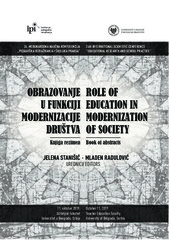Приказ основних података о документу
Epistemološka uverenja, ciljevi i strategije učenja i uspeh na studijama
Epistemological beliefs, learning goals and strategies, and academic success
| dc.contributor | Stanišić, Jelena | |
| dc.contributor | Radulović, Mladen | |
| dc.creator | Mirkov, Snežana | |
| dc.date.accessioned | 2021-08-11T08:39:31Z | |
| dc.date.available | 2021-08-11T08:39:31Z | |
| dc.date.issued | 2019 | |
| dc.identifier.isbn | 978-86-7447-147-0 | |
| dc.identifier.uri | http://ipir.ipisr.org.rs/handle/123456789/562 | |
| dc.description.abstract | Prikazani su rezultati empirijskog istraživanja koje je bilo usmereno na ispitivanje epistemoloških uverenja studenata, ciljeva koje postavljaju i strategija koje primenjuju u učenju. Ranija istraživanja su potvrdila da uverenja o učenju i znanju utiču na načine na koje studenti pristupaju učenju, da ciljevi koje sebi postavljaju i strategije učenja koje primenjuju utiču na uspeh koji ostvaruju, kao i da samoregulacija procesa učenja doprinosi pravilnom izboru i efikasnoj primeni strategija. Ispitano je 438 studenata Ekonomskog fakulteta u Beogradu primenom Upitnika o epistemološkim uverenjima i Upitnika o ciljevima i strategijama učenja. Razmatrani su i podaci o uspehu na studijama koji je izražen pomoću proseka ocena na ispitima. Prema dobijenim rezultatima, ispitani studenti su u većoj meri usmereni na dubinske ciljeve i na postignuće, nego na površinske ciljeve. U većoj meri primenjuju dubinske, ali i površinske strategije učenja, nego strategije usmerene na postignuće. Uspešniji studenti u većoj meri izražavaju uverenja da se učenje može naučiti i da je uspeh povezan sa napornim radom, usmereni su na dubinske ciljeve i na postignuće, primenjuju dubinske strategije i izražavaju viši nivo svesnosti o sopstvenom kognitivnom funkcionisanju. Manje uspešni studenti su skloni da traže jednoznačne odgovore, da izbegavaju dvosmislenost, u većoj meri su zavisni od autoriteta, usmereni su na površinske ciljeve i primenjuju površinske strategije. Rezultati ovog istraživanja ukazuju da bi kroz nastavni proces trebalo podsticati razvoj sofisticiranih uverenja o učenju i znanju, usmerenost na sticanje kvalitetnijih znanja i primenu strategija učenja usmerenih na razumevanje. Ako se studenti osposobljavaju da efikasno organizuju učenje, oni će biti pripremljeni da upravljaju učenjem tokom čitavog života. | sr |
| dc.description.abstract | The paper presents the results of empirical research aimed at students’ epistemological beliefs, the goals students set and the learning strategies they use. Previous research suggests that beliefs about learning and knowledge influence the ways students approach learning, that the goals they set themselves and the learning strategies they use affect their academic success, and that self-regulation of the learning process contributes to the adequate choice and effective use of strategies. The sample of 438 students of the Faculty of Economics in Belgrade was examined by the Epistemological Questionnaire and the Questionnaire on Learning Goals and Strategies. The data on academic success measured by the average grade on exams was also included. Obtained results show students are more oriented to deep goals and to achievement goals than to surface goals. They use deep strategies, but also surface strategies, more than achievement strategies in learning. The more successful students tend to express beliefs that learning can be learned and that success is associated with hard work. They are oriented to deep goals and to achievement, use deep strategies, and express a higher level of awareness of their own cognitive functioning. The less successful students tend to seek single answers and to avoid ambiguity. They are more dependent on authority, oriented to surface goals, and apply surface strategies. The results of this research suggest that the teaching process should encourage development of sophisticated beliefs about learning and knowledge, orientation to gaining a higher quality knowledge and use of understanding-oriented learning strategies. If the students are trained to organize their learning efficiently, they will be prepared to manage it throughout their lives. | sr |
| dc.language.iso | sr | sr |
| dc.language.iso | en | sr |
| dc.publisher | Beograd : Institut za pedagoška istraživanja | sr |
| dc.relation | info:eu-repo/grantAgreement/MESTD/Basic Research (BR or ON)/179034/RS// | sr |
| dc.relation | info:eu-repo/grantAgreement/MESTD/Integrated and Interdisciplinary Research (IIR or III)/47008/RS// | sr |
| dc.rights | openAccess | sr |
| dc.rights.uri | https://creativecommons.org/licenses/by/4.0/ | |
| dc.source | Obrazovanje u funkciji modernizacije društva | sr |
| dc.subject | epistemološka uverenja | sr |
| dc.subject | ciljevi učenja | sr |
| dc.subject | strategije učenja | sr |
| dc.subject | samoregulacija | sr |
| dc.subject | studenti | sr |
| dc.subject | epistemological beliefs | sr |
| dc.subject | learning goals | sr |
| dc.subject | learning strategies | sr |
| dc.subject | self-regulation | sr |
| dc.subject | University students | sr |
| dc.title | Epistemološka uverenja, ciljevi i strategije učenja i uspeh na studijama | sr |
| dc.title | Epistemological beliefs, learning goals and strategies, and academic success | sr |
| dc.type | conferenceObject | sr |
| dc.rights.license | BY | sr |
| dc.citation.epage | 79 | |
| dc.citation.spage | 78 | |
| dc.description.other | Zbornik rezimea / 24. Međunarodna naučna konferencija "Pedagoška istraživanja i školska praksa | sr |
| dc.description.other | Book of abstracts / 24th International Scientific Conference "Educational Research and School Practice" | |
| dc.identifier.fulltext | http://ipir.ipisr.org.rs/bitstream/id/1687/Epistemoloska_uverenja_2019.pdf | |
| dc.identifier.rcub | https://hdl.handle.net/21.15107/rcub_ipir_562 | |
| dc.type.version | publishedVersion | sr |

